criticism welcome, art reqs open, this blog is very disorganizedlobcorp: day 46 sol 50% / lor: not started / lcb: up to date
Don't wanna be here? Send us removal request.
Text
closed anon asks because i was getting an ungodly amount of spam
0 notes
Text

37 notes
·
View notes
Text

It's possible that this pebble is alive.
No one would call it an organism, but by the same token, I may not be alive if no one refers to me as such.
Perhaps it was simply a matter of laziness.
457 notes
·
View notes
Text
"Ethics is holding back scientific innovation and progress"

(original under cut)

36 notes
·
View notes
Note
'If asked about a specific thing' you say? Well, if possible could you tell your thoughts about 7.5-22, Witnessing? Or to be even more specific - the conversation between a (very much trying) Dante and Hong Lu?
I also must concur on the needing him dead bit. Gonna send him to be chased by an animal of some sort.
Oh boy do I have a lot of yapping to do about that particular scene.
Spoiler warning and all that.
Let me start with this. This exchange includes possibly the most blatant lies Hong Lu has ever said.
If you've read the Intervallo with any sort of understanding of what's going on, this should not shock you. Deception is a major thematic thread here, to the point that Outis, Miss Obvious Liar herself, was the other major focus Sinner outside of Hong Lu.
I'd say that about half of the things Hong Lu says during this conversation are just that, extremely blatant fucking lies, with the other half either being half truths or the final statement, which I'll leave for the end of this post.
So, let's see what shit Hong Lu is saying here. In order he says them. (Thank you to @mulberriesandtea for transcribing the scene onto cogitopedia already so I can use that for screenshots instead of going into the game itself for that.)
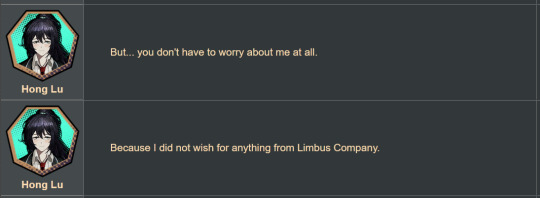
This, I believe, is a half-truth. And by that I mean it's a blatant fucking lie that might seem technically true only to Hong Lu himself.
I'll be blunt. I call bullshit on this. I refuse to believe Hong Lu genuinely was not promised something in return of him joining Limbus Company.
The main reason I have for that is the nature of the Golden Boughs. From what we've learned about them all the way up until current story events, Golden Boughs are entities that feed on the Desires of people to truly awaken their powers. It's clear that Limbus Company's own goals rely heavily on those awakened powers of the Boughs.
With that in mind, there is no way in hell Limbus Company would ever hire a Sinner with no powerful wish or desire, as that would be contrary to the point of the Department in the first place.
That being said, I call this part of the conversation a "half-truth" for a reason. Because while in reality Limbus Company might have very much offered to fulfill a desire of Hong Lu's, there is a very real possibility he considers the fulfillment of it truly impossible.
Hong Lu as a character is extremely fatalistic, with all signs pointing to him believing that no matter what he does, his fate will remain unchanged. As such, it's very likely that because of this fatalism, he believes there is no way for Limbus Company to actually fulfill his wish, as to be able to do that would potentially mean subverting fate itself. Thus, to him, it's as if he never wished for anything at all.

This one might just be the biggest and most blatant lie Hong Lu has ever told.
I've already talked about how extremely emotionally repressed Hong Lu is at lengths, so I'll just summarize it thusly.
Hong Lu is the only Sinner who realized the core of what Yi Sang's troubles are. He is the only Sinner to consistently reach out and check up on Yi Sang, always specifically doing so when Yi Sang is locking up his thoughts and feelings rather than verbalizing them. It is clear that, despite their differences, Hong Lu deeply relates to Yi Sang and understands him on a level nobody else appears to.
Do you see what I'm talking about?
Hong Lu is the only Sinner at all to understand that hiding one's true feelings is what Yi Sang's issue actually is.
My brother in Christ is saying he's seen Yi Sang at the devil's sacrament when we should all be asking what the fuck He himself was doing at the devil's sacrament.
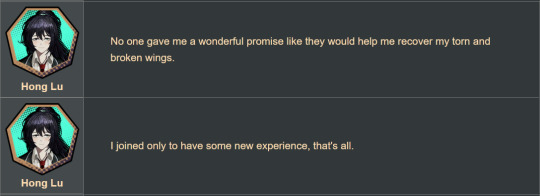
This one I would say is another blatant lie, though perhaps not as blatant as the one that directly precedes it.
Again, I'll be blunt. Every time Hong Lu has used the 'new experiences' excuse was just a straight up lie, with one of the few instances of a downright Confirmed lie coming from one of such excuses.
To go a little bit deeper, Hong Lu seems to use this lie in one particular kind of situation - when discussing the reasons he left the Jia household. He mentions it in his K Corp ID, where the NPC he's talking to outwardly doubts it due to it not making sense with his current situation, and he mentions it in TKT, which is downright confirmed to be bullshit due to Xichun mentioning in Canto 7 that his Family is looking for him. A very strange thing for them to do if he were telling the truth, as if they wanted him to experience as much of the world as possible, then why would they ever want to cut that short?
The fact that he's using this excuse here means that his reason for joining Limbus Company is likely to be closely related to his reason for leaving the Jia household.
If you're like me and believe that Hong Lu actually ran away from home, then this would explain his evasion here - he likely joined Limbus Company as a way to hide, maybe even at some point hoping that they would grant him some protection, if even temporarily. After all, with how fatalistic Hong Lu is, it's likely that even at the time of him joining the Company, he already knew his time was limited and that he would inevitably be found anyway.
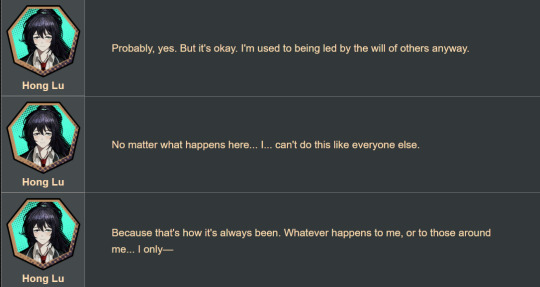
This is the last statement Hong Lu makes before we get the cartoon reveal of almost fucking everyone listening in on the conversation.
I believe that this is the only part of the exchange where Hong Lu is actually completely genuine.
Considering how fucking loud the themes of objectification and total ownership of people were in just this Intervallo alone, this first sentence is pretty clear. Because we can tell that yeah, Hong Lu had very little agency in his life. He is, by his own words, used to being led by the will of others.
However, it's the two lines that intrigue me. Because I believe there is a degree of emotional vulnerability to them that Hong Lu rarely if ever shows.
A degree of worry and concern that Hong Lu has refused to shown for the entirety of the Intervallo.
While what he says here is very vague, I think it is still very telling.
There is something that makes Hong Lu believe that his turn will be different. Not just will, but has to be. Something that only Hong Lu knows that makes him sure that no matter what, he can't go through the same thing everyone else has.
Which is. Very intriguing. Because there is a very wide range of things that have happened.
It can't be just that he knows he'll fail or something along those lines, because we know it has happened before. Gregor, Rodya, and even to a degree Sinclair all failed in one way or another.
It can't be that he doesn't remember or isn't human, because, again, that's also something we've seen be done before. In the Canto right before his no less!
No, there is something else to it. Something he alludes to in his next line.
I think this is, again, Hong Lu's fatalism rearing its ugly head. There is a cycle Hong Lu has been living in for his entire life. Something that he's done his entire life no matter what happened to him or to those around him.
We've seen Sinners succeed to subvert fate itself. We've seen Sinners fail to do so, unable to change themselves in the moment.
But... have we ever seen a Sinner simply give up completely?
I believe that's what Hong Lu believes his turn will be like. That once worst comes to worst, he won't even be able to try. That he'll simply lie down and take it, as he always has.
He believes that the cycle will continue on repeating, no matter what happens. Because it always has. Because this flow cannot be stopped. Because he can never truly escape his Family.
But here's the thing about that.
Hong Lu is wrong. Because he did break the cycle. Even if just once, even if for just a moment. He did escape, he did take action when it mattered.
...It reminds me of something that Binah said in Ruina after the end of her Floor's Realization.
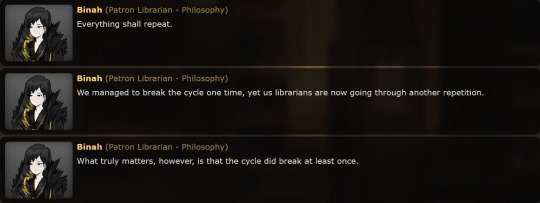
What truly matters, however, is that the cycle did break at least once.
Hong Lu, whether he believes it or not, has already done the impossible.
And when it has been done once, that means it's no longer impossible.
It can happen again.
And it will happen again.
Destiny be damned.
172 notes
·
View notes
Note
Thoughts on the new Jia candidate? They seem to be at the very least related to Iori, considering their execution of that one guy and the red snake skin wrapped around himself and his companion(?). Makes me wonder if Iori or her disciples are going to make a physical appearance in the Canto.
Alright, let me put things under the cut for the spoiler warning for literally the last two cutscenes in this Intervallo.
When it comes to Jia Qiu, I don't have many thoughts on his place in the world or wider story as of yet.
It's clear that he's a figure that's meant to have quite a lot of renown, one that can be easily believed as being the one people sing about in the Backstreets. One that is so sure of his position in the world that he doesn't even bother finishing off Xichun or Hong Lu due to knowing they don't pose even the tiniest bit of a threat to him.
It's also interesting how he's described. There's a lot of similarities between him and Hong Lu in that way. He's shown to be always serene, almost intimidatingly so. The way he looks at the Sinners, "as though he was gazing upon the clouds or blades of grass", is a direct reflection of how Hong Lu is described earlier in the same Intervallo. In fact, that confident calmness of his is shown to be what makes him so intimidating.
As for the Iori connection... Well, first of all it's made kind of unclear who Actually kills Shi Yihua. Before the execution happens, Zigong comments on the presence of "a serpent", while Jia Qiu tells her to "leave it". After Yihua is killed, Qiu once again repeats to leave this serpent alone, this time directing the order to Zilu.
This, I think, implies that whoever killed Yihua is not actually affiliated with Jia Qiu at all. That 'serpent' who killed him was an outsider, a spy of some kind that Jia Qiu deemed unimportant enough to let live despite the sudden seemingly hostile action.
It's also important to note that the furry trio from the Prologue all have specifically Purple accessories. While Iori's connection with snakes and serpents is an important part of her identity, what's often more important and identifying is the color Purple due to it being a direct part of her Fixer title.
Thus, personally, I believe the serpent could have some connection to Iori, as it has both the purple and the snake imagery to tie it to her.
Jia Qiu and his posse on the other hand not only are implied to not be affiliated with that serpent, but also only have the snakeskin motive, not the color. It's kind of like the Rabbits of R corp and Hares of the Heishou Pack - they're based on similar animals, but are at their core extremely different and unaffiliated.
But. That's not really what I want to talk about.
No, what I want to talk about is what I think Jia Qiu's narrative role might be.
See, here's the thing about Jia Qiu and his posse. Neither him nor anyone following him are directly named after any DOTRC characters.
However, another source for specifically Zilu and Zigong has already been found - they're named after Confucius's disciples. The reason why that's important is that Confucianism plays a major role in DOTRC, with one of the ways it comes up being a notable part of the reason why Baoyu is abused by his father - as Jia Zheng is a Confucian scholar that tries to live by those values, while Baoyu is anything but.
Thus, there are now two camps I see when it comes to theories on who Jia Qiu is meant to be based on.
There is the camp that believes Jia Qiu might be PM's reinterpretation of Jia Zhu, Baoyu's older brother who dies before the events of DOTRC.
There is also the other camp that looks at the references to Confucius's disciples and believes that Jia Qiu is just straight up Confucius himself.
My take? I think he's both. I think he's a composite character of both Jia Zhu and Confucius. And I even have a sound reason for why PM would do that.
Remember how I mentioned that Confucian values are part of the reason why Baoyu is targeted and abused by his father so much? Well, Jia Zhu is the other part of the reason. Jia Zhu, when he was alive, was exactly the kind of son and heir that Jia Zheng wanted. So, when he died, all of those expectations fell onto Baoyu. There's even a point where Baoyu's mother has a moment where she laments that she wishes Baoyu was the one to die instead of Zhu, as Zhu wouldn't have angered his father nearly as much.
I believe that Jia Qiu is meant to represent everything that Hong Lu's family wishes he could be. Everything that Hong Lu can't truly be no matter how much he tries. A combination of the creator behind the values forced upon everyone in the family, and of the family son who was perfect for the role in his family. The ideal heir, the template Hong Lu was meant to fit but never could.
Something tells me he's not going to survive for long.
98 notes
·
View notes
Note
Doesn't Two in One kind of really just reiterate on themes that are present with Don Quixote/Sancho? I feel like any idea of that theory has to coincide with the fact that Sancho herself has a ton of duality themes and imagery and that with the amount of family motifs repeating it feels like it would be a little clunky to have them having similar character arcs along those lines.
Well, first of all, let's get one thing straight: I didn't just randomly come up with duality motifs for Hong Lu.
They are, already, very much there in the game itself when it comes to Hong Lu's E.G.O. corrosions and other places. That's not something I just randomly came up with, it's all already there. All I'm doing is pointing at and trying to explain why it might be there. Even if this theory didn't exist, the motifs and imagery wouldn't just disappear.
That's something you'd have to bring up with PM themselves, not with me. //silly
As for the similarity in character arcs you bring up... there are two ways I could respond to that. Both which I think are important to mention.
The first is that, well, Don Quixote and Hong Lu are already set up as being major parallels to each other. There are already many other little motifs and details that the two overlap in.
Donqui and Hong Lu are two out of the three Sinners to wear nameplates rather than ID cards on their uniforms. They're two out of the three Sinners to have something strange going on with their eyes. They're the only two Sinners whose base E.G.O animations have them enter the frame from off-screen rather than start off already standing there. They're both compared to actors in one way or another. And most importantly, the 'Oblivion' mentioned in Don Quixote's Sinner color is directly compared to naivete in the story itself, meaning it's effectively a synonym to the epithet of Hong Lu's Sinner color - 'Naive'.
The fact that Donqui's Canto was for a good chunk of it effectively a prologue to Hong Lu's Canto isn't just some random coincidence - it's meant to highlight that the two are similar in a way that isn't immediately obvious.
Their arcs being similar is already set up to be kind of the point.
The second thing is that you seem to think that the degree of "similarity" you expect this theory to lead to would make the two arcs downright identical, when... in all honesty I don't think that'd be the case.
Sure, if you look at the two from the bare bones surface, you could Maybe make the argument that they'd be 'too similar' - someone who is stripped of their humanity and is part of a family that defines their life recognizes a part of themself and decides to move on despite the setbacks.
However, there is. A lot more to their stories. And a lot more differences that directly contrast the two in a way that would make them serve as proper narrative parallels.
Don Quixote's dehumanization comes from outside of her familial circle. Hong Lu's dehumanization comes from inside his family.
Don Quixote's family has good intentions but either don't realize the harm they're causing or have no other choice. Hong Lu's family has bad intentions and simply don't care about the harm they're causing.
Don Quixote wished to stay with her family but was forced to leave. Hong Lu was forced to stay with his family but wished to leave.
Don Quixote abandoned her former identity in favor of continuing someone else's legacy. Hong Lu abandoned his former identity in favor of becoming a person that's completely fictional.
Don Quixote started off as someone who acted fully genuine but came out of her Canto deciding to wear a mask that lets her be happy. Hong Lu started off as someone who was a complete fraud but would come out of his Canto more genuine with himself as his mask only furthered his fatalism.
Don Quixote didn't know she was lying. Hong Lu knew and was doing so on purpose.
...I could go on, but I think you get the point.
The reiteration is the point. It's meant to highlight the similarities while contrasting the differences. That's generally how narrative parallels work.
89 notes
·
View notes
Text
Nocturnal Sweeping Intervallo teaser frame-by-frame analysis
That's right, you didn't think I was going to leave this teaser without saying anything about it, did you? In fact, I have. Way too fucking much to say really.
Before anything though, I wanna give a shout out to @chorin342 for the translations of the hanzi that shows up during the trailer, which helped A Lot with figuring out what awaits us.
Now, onto the trailer itself.
After the several seconds long title screen of the Intervallo, we're given another view of the setting, this time with a sort of tv screen-esque overlay. The whole teaser seems to be somewhat structured to mimic a sort of action movie trailer, potentially hinting to this potentially being a more action-packed Intervallo.
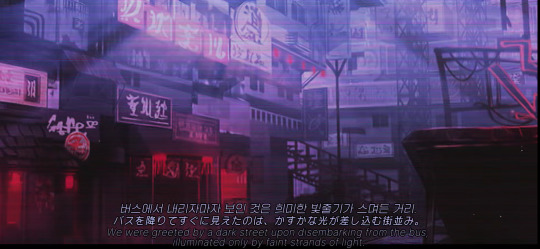
The text (which in case it's hard to read on the screenshot says "We were greeted by a dark street upon disembarking from the bus, illuminated only by faints strands of light.") accompanying this CG seems to be a part of Dante's narration based on its contents. We're likely seeing a glimpse of just the intro part of the Intervallo.
After a few seconds, the following pops up on the screen with a booming sound effect:
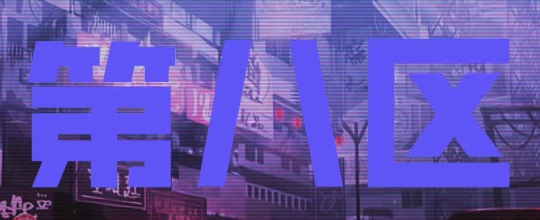
This simply translates to "District 8", further confirming information that is about to be revealed.
Just as this text disappears, the narration continues, saying "It was immediately obvious that we had arrived in the Backstreets of H Corp."
Similarly to what I and many other speculated, we are going to H Corp's District, and the Intervallo specifically takes place within its Backstreets.
Then, we get the two following bits of text:

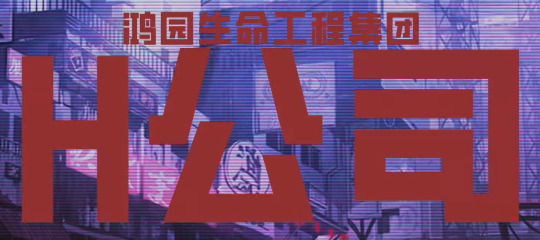
This translates to "Hongyuan/Hong garden Life Engineering Corporation". Or, as the second one illuminates, the full name of "H Corp".
In addition to the reveal of H Corp being a company that specializes in engineered life, the character for the "Hong" part of the name is the exact same as used in Hong Lu's own name. The connection is already clear and we're barely fifteen seconds into the teaser.
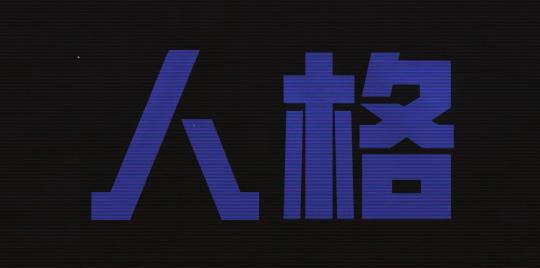
Then we're onto the Identity trailers, with the above literally just being that. "Identity".
Both the Outis and Ryoshu Identities belong to the Heishou Pack - Mao Branch. Heishou translating to Black Beast, and Mao translating to Rabbit in the context of the twelve Chinese zodiac animals, as well as Wood in the context of the five Chinese elements.
I'm not going to go over the Identity trailers in too much detail, but I will mention things that I think will be important to the plot of the Intervallo.
The Mao Branch of the Heishou Pack appear to be a group hired by whoever they call "lord". Notably, both Identities express that their loyalty lays with the one that holds that title, rather than a specific individual. They're shown to be ready to betray the one who formerly carried that title at a day's notice, and are aware of their nature enough to deem themselves inherently untrustworthy.
In both trailers the Identities face off against average-looking gangsters. Those are likely to be the enemies we face off during the intro part of the Intervallo, before we run into any Sweepers.

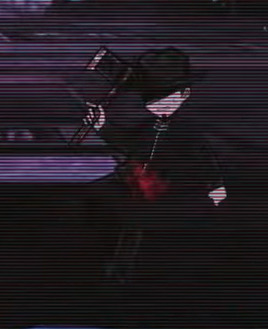
According to the Identities' other voice lines, the Mao Branch's job takes place primarily during the night, potentially "taking care" of whatever target they're given by their lord by killing them in the middle of the night and letting the Sweepers clean them up before anyone can find any evidence.
Ryoshu's Identity here also makes a very interesting comment, about how the Mao Branch has "the same roots" as R Corp's Rabbit Pack, but "have grazed on different grass" and thus comparing them to each other is deemed stupid. Considering the implication of H Corp being a "life engineering" company and R Corp's technology in cloning, this might imply that their respective technologies are in some way similar in nature, yet different enough that it'd be stupid to actually compare them.
I also want to make a small observation about the aesthetics of the group. Specifically their color palette of black and yellow. It honestly kind of reminds me of the Udjat and Arbiters, and considering both of those are essentially military forces (hired by a private individual and a governing body respectively) it might allude to the Heishou Pack's nature as being not that unlike them.
Alright, back to the rest of the trailer.
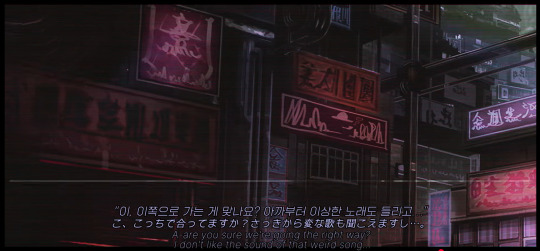
We get another CG of the Backstreets, alongside what appears to be actual dialogue. (In case it's too hard to read, it says "A-are you sure we're going the right way? I don't like the sound of that weird song...") The most likely candidate to be saying this is Sinclair due to his tendency to stutter and appear nervous when he speaks, but it could be someone else as well.
Either way, this line implies that someone is guiding the Sinners through the Backstreets, potentially into somewhere dangerous and definitely suspicious.
Another text appears:
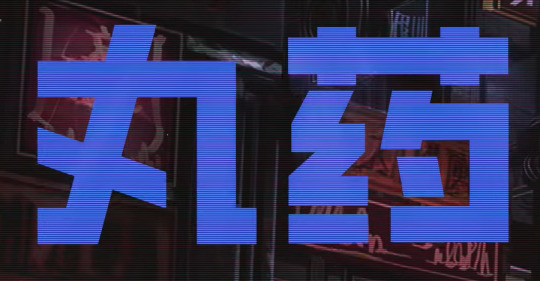
This literally translates to "round medicine", but it also appears to be the same word as used in two of Xichun's passives, that being bolus. Bolus in this context likely refers to a type of medicine administration, where a dose is introduced to the body to take effect over a short period of time.
Considering H Corp's "life engineering" (perhaps even downright bioengineering) tech, they might have a notable interest in pharmaceuticals as well.
Next scene.
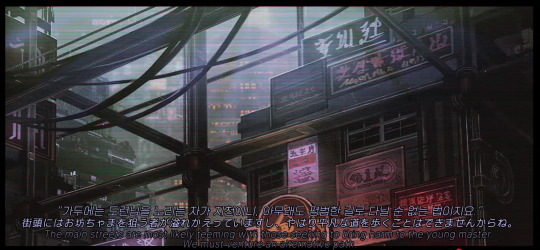
Another view of the Backstreets, this time giving us a clear view of the Mansion taking up the entire goddamn skybox.
The text here (reading "The main streets are most likely teeming with those seeking to bring harm to the young master. We must venture an alternative path.") appears to be a piece of dialogue from an unknown party.
What we can tell about this person is that for one, they're the one guiding the Sinners through the Backstreets, meaning that the Sinners are completely at the mercy of this unknown party. The second thing we can tell about them however is that they're clearly aware of Hong Lu's identity and his ties to the Jia Family.
Considering what we've seen in the Identity trailers, I'd like to suggest that the Heishou Pack aren't going to be our enemies, or at least not at the start. They're likely to be hired by the Jia Family, and thus would have interest in keeping Hong Lu "safe". However, just because they want to protect the young master from harm, doesn't mean they feel the same way about the rest of the Sinners... if you know what I mean.
Next hanzi show up here.

This one translates to "complex" in the context of a building. This could potentially refer to the Mansion in the background, calling it a complex and thus potentially a sort of conglomerate of multiple Mansions. Alternatively, it could be referring to the dwellings Sweepers use, calling those dens a complex of their own.
After this we get a quick glimpse of a black screen getting covered with red Sweeper eyes and a rising noise. Likely foreshadowing as to what awaits the Sinners if they are to follow their new guide.
The scene changes again.
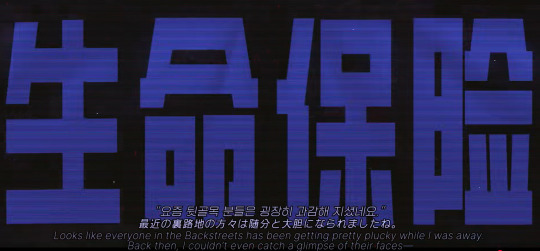
Multiple things. While I didn't capture it in this screenshot, combat takes place in the background here. While it's hard to make out because of the big fuckass hanzi in the way, it appears as if the Heishou Pack is fighting alongside the Sinners rather than against them, further implying that they're the ones guiding them through the Backstreets.
The hanzi here translates to "life insurance". This honestly could refer to a lot of things. It could refer to the Heishou Pack's role as being there to insure Hong Lu preserves his life. It could refer to H Corp's interest in immortality and thus insuring their own life. It could even potentially imply that H Corp deals with more literal life insurance, perhaps being in the business of insuring people with "spare lives" not unlike the situation of Pamela and Pameli in Ruina.
Notably, the "life" in life insurance here uses different characters to the ones commonly used in the term. However, this could just be an instance of PM being a Korean speaking company and thus not knowing the "proper" spelling of the phrase. A mistake in similar nature to them flipping Linton's first and last name, or calling "Don" a surname rather than a title in the original Korean script.
The dialogue here (reading "Looks like everyone in the Backstreets has been getting pretty plucky while I was away. Back then, I could even catch a glimpse of their faces-") is pretty clearly coming from Hong Lu, and continues on (reading "-Because they'd all be on their hands and knees whenever we walked past... Ah, what a wonderful change!").

This bit of dialogue establishes multiple things. For one, the Jia Family is important enough to garner extreme amounts of veneration from District 8 citizens, even out in the Backstreets. However, and more interestingly, for whatever reason Hong Lu alone isn't eliciting the same reaction. Whether it's because as Hong Lu says and there his been a shift in the status quo in the Backstreets, or whether it's something else that is causing people to not recognize Hong Lu as part of the Family is currently unclear.
Then, Ricardo Announcer. You get nothing from me about that, I just find it really fucking funny.
Then, back to the mayhem.
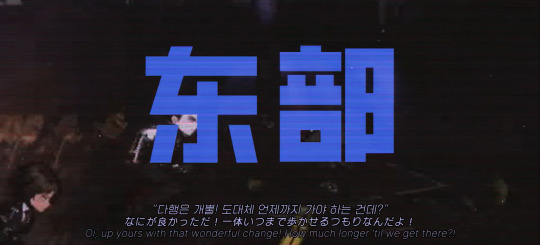
Here the text translates to "east" as in the context of a region. Which, makes sense. We are in the East region of the City now, this is likely a reference to that.
The dialogue here (reading "Oi, up yours with that wonderful change! How much longer 'til we get there?!") very likely comes from Heathcliff judging by the wording. It further foreshadows the suspicious nature of the Sinners' guides and that they might not be leading them where they think they are.
And, in case that wasn't already being made clear, in the background a wave of Sweepers just fucking descends upon the Sinners before static takes over the screen and we're back to the core event illustration.
So.
Let's summarize what we can gather from this trailer.
Our current destination, H Corp's District, is run by Hongyuan Life Engineering Corporation, a Wing with an interest in life insurance and pharmaceuticals. The Jia Family appears to be highly regarded in this District, to the point of likely being the ones who hired the Mao Branch of the Heishou Pack, a group specializing in operations under the cover of the night who are loyal to those holding certain ranks rather than to specific individuals.
Upon their arrival, the Sinners would come in contact with this group, who would recognize Hong Lu as a young master of the Family that hired them, and would thus wish to ensure his safety and likely return him to his home. As such, they serve as guides and allies for the first part of the Intervallo's plot.
However, the path this Pack leads the Sinners down is suspicious and long, and eventually leads them towards the Sweepers. There is a high chance that this was the Pack's trap all along, whether their motives are to take Hong Lu out because of an order from one of his siblings or to retrieve him and take him back to the Mansion while leaving the rest of the Sinners to die is yet to be seen. Either way however one thing is clear - the Black Beasts are indeed not to be trusted.
115 notes
·
View notes
Text
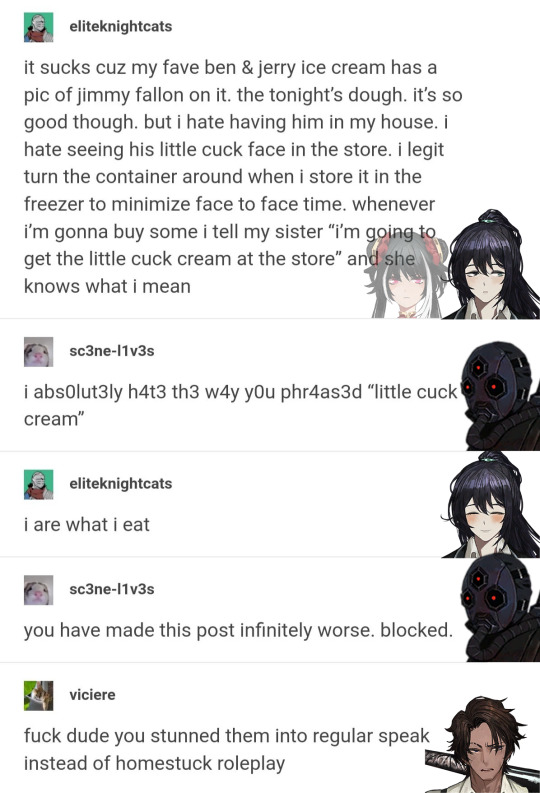
this is how I think Nocturnal Sweeping is gonna go
567 notes
·
View notes
Note
So the new Vergillius announcer has personaized, specialized quote for each specific Sinner, and it's a fascinating mixture of praise and burns. In order, (so Yi Sang first and Gregor last):
"Impressive, Sinner #1. You seem to have a surprisingly high aptitude for Identity and E.G.O usage." "Ms. Faust… You knew that enemy part would eventually cause trouble, didn't you?"
"… What did Sinner #3 do this time? Haah…"
"Hm, your battle sense is just as excellent, even as a Sinner. Now, is there something you can do about your incomprehensible speech quirk, Sinner #4?"
"Excellent, Sinner #5. I hear that your quick actions have prevented many a disaster."
"… Don't think you can smooth over your terribly ineffective attack with an innocent smile, Sinner #6."
"Sinner #7. I thought you'd finally learned how to use that head of yours… It has been a while since our last consultation, hasn't it?"
"So I hear that you're the class president now, Sinner #8? Then it's time you took to the helm."
"I do appreciate how easy you are to please, Sinner #9. You may expect sweets should you perform well in this battle, of course."
"You've got blood on you again, #11. … Hm, I suppose you have indeed grown somewhat as of late. I thought you'd be bawling on your knees by now."
"What's this, miss lieutenant? How come you've let yourself be sliced to pieces like this? You're going to be the biggest burden to your Executive Manager dearest."
"This is no time for your defeatist attitude, Sinner #13. Get on your feet and soldier on. Where's your usual disposition, hm?"
I'm don't think this is a uniform scan of how Vergillius views each Sinner, but there are some fascinating nuggets-Rodion straight up getting bribed, a hint of Yi Sang having the best synchronization rates with IDs and EGO, and the possibility of Vergie knowing about Faust's psychic knowledge link deal.
It's, naturally, the Hong Lu one I'm coming to you with-I wonder if it's as innocent as it looks (Hong Lu did an ineffective attack and tried to laugh it off, Vergie Ain't Havin' It), or if Vergie can legitimately see right through Hong Lu's act (or knows his Deal all along).
Anon, you have no idea how perfect your timing is. Since I have recently done an attempt at analysis of all those lines in a random Discord server. So instead of dilly-dallying, I'm just gonna mostly repeat what I said then.
Before I do get to the Sinner-specific lines, I do want to briefly go over my thoughts about Verg's other lines, the ones directed at Dante.
Notably, a large amount of them has a much more gentle, if not downright warm tone to them. There is a level of patience, curiosity, and even sometimes concern that Verg shows towards Dante yet doesn't direct towards the rest of the Sinners.
There is very little to no condescending language directed towards them, which is in stark contrast to the vast majority of Verg's Sinner specific lines.
I wanted to point all of this out as Vergilius is a character who staunchly refuses to connect with people, and in reaction the people around him refuse to connect with him. There's very few people he actively tries to be kinder to, usually people he already knows, with it being most obvious with how he treats Charon.
Thus, the fact that Verg treats Dante with a level of kindness he doesn't extend towards the other Sinners implies a prior emotional connection we have yet to learn the specifics of.
Alright, with that little intro out of the way, here's my interpretation of each of those Sinner-specific lines one by one.
Yi Sang
One of the few positive voicelines, however the compliment Verg gives Yi Sang here can be read as somewhat backhanded due to the usage of "surprisingly", implying Verg doesn't actually hold high expectations towards him.
I also think that Verg specifically complimenting Yi Sang's usage of Identities and E.G.O could be another reflection of his not that high opinion of him. Verg is effectively complimenting not Yi Sang's own strengths, but rather his skill at borrowing power from other sources.
Faust
The only Sinner besides Dante that Verg refers to by name, showing that he holds a level of respect towards her that he doesn't for the rest of the Sinners. Considering the fact we know she's the one who hired him effectively, it might be more so a formality on his part than a reflection of any sort of closeness.
I have a couple of interpretations for what he says here, but in both of them it's clear that Verg feels a sort of exasperation towards Faust, and that he's aware of her downright supernatural levels of knowledge.
One interpretation is that he's expressing frustration, effectively accusing Faust of taking so long to act despite clearly having known ahead of time that the part would become a problem in the future. This is one of the patterns Faust shows, as she has a tendency to simply let bad things happen even when she knows they're about to, only ever doing something when she has no other choice.
The other interpretation is Verg being vexed by Faust's quick actions and efficiency, knowing that she only did so because she had the information that would tell her it had to be done. This is another pattern she exhibits, as she highly values efficiency and following the orders and information she has access to above her own opinions.
Don Quixote
Probably the most straightforward one. Verg's opinion of Don Quixote was so badly affected by how much trouble she's caused that now he's come to expect her to be the source of any potential mishaps.
There's also a notable sort of resignation to this voiceline I feel. It gives the impression that Verg has given up on trying to discipline Don Quixote, feeling like no matter what he does she's just going to keep causing issues regardless.
Ryoshu
The one line where Verg expresses both a positive and negative opinion simultaneously. Verg clearly holds a certain amount of respect towards Ryoshu, acknowledging her battle prowess even when nerfed. However, he also makes sure to undermine the compliment to make it clear he has no fondness towards her by calling out a trait of hers that he finds irritating and perhaps knows she's unlikely to change.
Interestingly enough, I feel like there's something to be said about how surface-level his jab here is. When it comes to the other Sinners he makes jabs at, he tends to target something they're a lot more sensitive about. Here however? Nothing of the sort. I think when Verg calls Ryoshu's speech quirk "incomprehensible", it reflects his opinion on Ryoshu as a whole - he finds her equally incomprehensible, unable to understand her as a person.
Meursault
Probably the only entirely positive voiceline out of the lot, neither backhanded nor condescending. Verg shows appreciation for Meursault's reliability, and might even be subtly throwing shade at the other Sinners by implying they could be the cause of the disasters in question. Not much else to say here lmao.
Hong Lu
I think this line very clearly shows Verg knows Hong Lu is full of shit. Not only does Verg call out the fact that Hong Lu is trying to get away with messing up, he also directly calls out the "innocent smile" as Hong Lu's method of doing so. He can tell Hong Lu's innocence and naivete isn't entirely genuine, but rather that it's a shield he uses to evade criticism and negative attention.
Also this is the only voiceline where Verg directly calls out a Sinner's attack as being dogshit. The others are a lot more vague about what caused Verg's reaction (except for Outis but we'll get to her), but here Verg confirms that the thing he's annoyed by is Hong Lu's offense. Considering my other analyses about Hong Lu caring more about his performance of combat rather than being actually effective at it based on his animations... no yeah, that tracks Perfectly.
Heathcliff
This is. An interesting line. I would probably need a whole separate post to get into it in detail, but to make a long story short it's pretty clear that as of the current point in story Heathcliff is the only Sinner that is actively trying to reach out to Verg and treat him like a person, and Vergilius is very much noticing that and (perhaps subconsciously) beginning to warm up to Heathcliff.
Why do I say all of that? Because I believe this line is a reflection of that relationship. See, both of the things Verg says about Heathcliff here are him noting that he thought Heathcliff was improving. That he was actually smart, that he hadn't needed any discipline in a long time. This line to me feels less like an insult or a jab, and more like an expression of disappointment.
Whether he wanted to or not, Verg was slowly starting to form a sort of bond with Heathcliff, enough to feel disappointed when Heathcliff fucks up and to try and distance himself. Mind you, he's still being an ass and vaguely threatening about it, but it's still something to note.
Ishmael
First of several voicelines where Vergilius is openly condescending towards whoever he's talking about. Calling Ishmael a class president is not only Verg acknowledging Ishmael's tendency to effectively speak for the Sinners as a whole several times, but also putting her down by effectively calling that behavior immature and something a child in school would be doing.
Then he basically goes "can you stop fucking around" by telling her to actually take charge and be responsible for once. Because despite how she presents herself, Ishmael is kinda bad at this whole personal responsibility thing.
Rodya
Similarly to Heathcliff, I think this voiceline is a reflection of Rodya's relationship with Verg as a whole. Again, to summarize, Rodya consistently puts on an overly casual and friendly act when interacting with Vergilius, despite her actual opinion on him being basically in line with the rest of the bus - she doesn't like him one fucking bit.
I think the first part of this line is Verg low-key calling her out for that, calling her "easy to please" in a very facetious way to show how see-through her act is to him. He is fully aware she does not like him but pretends to anyway.
Then there's the second part. I don't think Verg is genuinely trying to bribe Rodya. I interpret what he says here as his attempt at giving her a taste of her own medicine. Rodya regularly acts overly friendly towards him, so for a moment he acts overly familiar as well by offering sweets for a job well done. He's being an asshole and he knows it. The fact that he's effectively making a jab at Rodya's not-so-secret food insecurity only makes it more obvious that he's being an ass for the sake of being an ass.
Sinclair
Maybe the most backhanded lines of all of them if I'm honest. Verg is both acknowledging Sinclair's growth as a person while also putting him down by reminding him of the pathetic state he was at the start. Another Sinner he clearly has low expectations of.
I think this also shows Verg's tendency to underestimate the Sinners, specifically when it comes to their ability to change. I slightly alluded to it in Don Quixote's section, but Verg pretty clearly doesn't expect any of the Sinners to change for the better, and is thus surprised when he sees Sinclair prove him wrong.
Outis
If Sinclair's line is the most backhanded one, then this is the most condescending one with the most obvious animosity. Outis is the only Sinner that Verg calls something other than their number or name, instead giving her a frankly patronizing sounding nickname. He's both reminding her of her supposed role by calling her "lieutenant" while also putting her down by adding that "miss" in front.
Every single thing he says towards her is meant to put her abilities into question and make her seem incompetent. Considering that Outis regularly brags about her abilities and is the only Sinner to show she's not afraid to fight him, it's clear he's trying to take her down a peg. This shit is personal.
Him calling out her partially facetious attachment to Dante is also notable, as protecting them was the excuse Outis used when she first stood up to Verg. It's clear that moment left quite the negative impression on him.
Gregor
Last but not least. I think this line is another example of Verg seeing through a Sinner's facade, just like he did with Hong Lu and Rodya. He's calling out Gregor's go-getter facade by questioning where his "usual disposition" went and comparing it to his genuine attitude, that being the defeatism and unwillingness to participate.
There's also I think an interesting layer to this line, that being how it could be referencing back to Canto 1. Verg is effectively telling Gregor that one failure isn't a good enough reason to give up, perhaps subtly implying that he's already over Gregor's fuck up and would much rather not have to deal with what he might consider self-pitying.
174 notes
·
View notes
Text
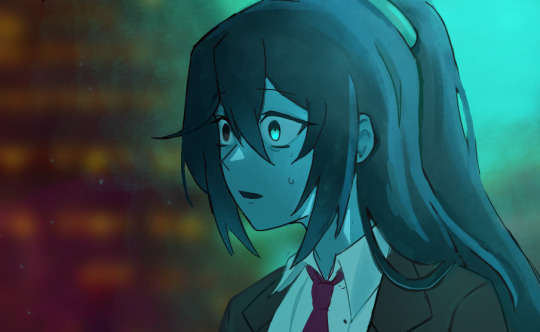
One month left! Enjoy it while you can chinese boy.
2K notes
·
View notes
Text
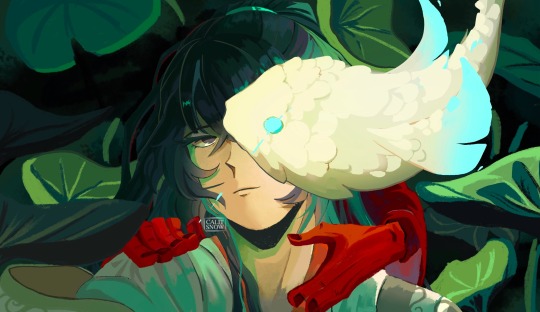
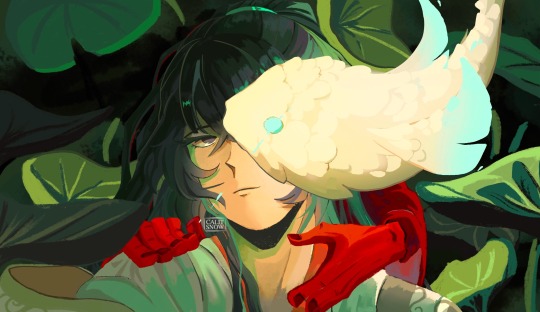

[However, the world is more than simple warmth and light]
(Click for better quality)
298 notes
·
View notes






